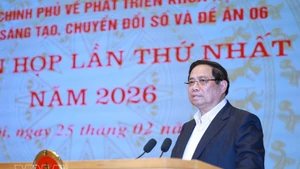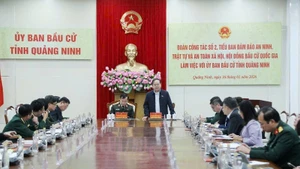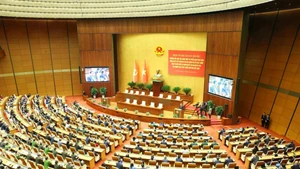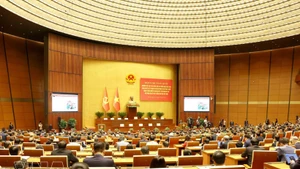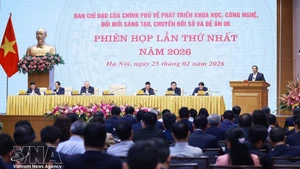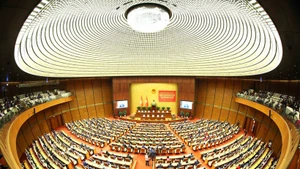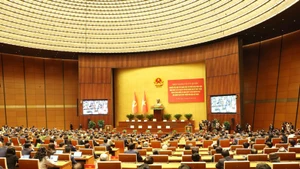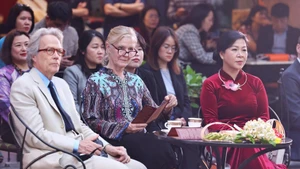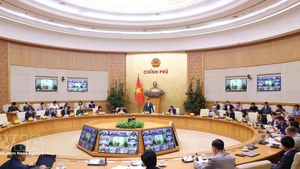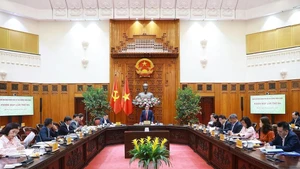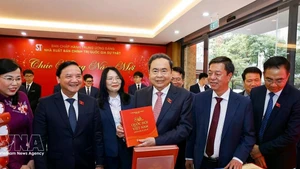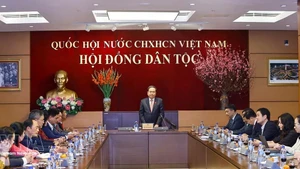Following the government’s submission of a consolidated report summarising public feedback from various sectors and administrative levels on the draft resolution amending and supplementing certain articles of the 2013 Constitution to the Committee for Drafting Constitutional Amendments, Minister of Justice Nguyen Hai Ninh gave an interview to the press on this significant matter.
Journalist: Minister, what is your general assessment of the results of public consultation on the draft resolution to amend and supplement certain articles of the 2013 Constitution?
Minister Nguyen Hai Ninh: The organisation of collecting opinions on the draft resolution was carried out on schedule in a serious, public, democratic, and scientific manner by ministries, branches and localities, closely following the plan of the Drafting Committee to amend and supplement a number of articles of the 2013 Constitution and the direction of the government.
A wide range of consultation methods was employed. According to statistics, more than 288,000 meetings — including deployment sessions, briefings, seminars, workshops, and discussions — were held to collect feedback on the draft Resolution. Over 280 million comments from agencies, organisations, and individuals were recorded. Notably, public feedback via the VNeID application attracted more than 20 million citizen participants.
On average, the approval rate for the contents of the draft resolution reached 99.75%. This overwhelmingly high level of agreement affirms that the constitutional amendments truly reflect “the Party’s will and the people’s sentiment”, demonstrating a high degree of consensus and unity across various social strata, governmental bodies, and administrative levels.
Journalist: During the consultation process, what were the findings regarding the regulations on administrative units and local government, and which option does the government support?
Minister Nguyen Hai Ninh: The government agrees with the proposal to amend and supplement Article 110 of the constitution in the draft resolution in order to institutionalise the policy on streamlining the organisational structure of the political system, as outlined in Resolution No. 60-NQ/TW.
The revised provision adopts a general approach rather than listing specific administrative units, thereby allowing flexibility in adjusting the administrative model to suit practical demands and new requirements without needing to revise the constitution itself.
Accordingly, the National Assembly would determine the organisation of administrative units through laws or resolutions, ensuring adaptability to the circumstances of each period.
However, the government proposes retaining the provision of Clause 2 of Article 110 of the 2013 Constitution, which states: “The establishment, dissolution, merger, division, or adjustment of the boundaries of administrative units must be subject to public consultation and carried out in accordance with legal procedures.” This safeguard is essential to uphold the people’s democratic rights and provide a legal basis for public discourse on matters directly affecting them.
In addition, the government suggests maintaining provisions on the right of People’s Council deputies to question the chairperson of the People’s Committee, other members of the People’s Committee, the Chief Justice of the People’s Court, the Chief Procurator of the People’s Procuracy, and the heads of agencies under the People’s Committee. These provisions form the foundation for their implementation in the Law on Organisation of Local Government and other relevant laws. Moreover, the government supports adding special provisions regarding the organisation of local government in special administrative-economic zones in the Law on Organisation of Local Government.
As for other related matters, the government also agrees to amend Articles 111, 112, and 114 of the 2013 Constitution in the direction of defining local government as comprising the People’s Council and the People’s Committee, without using the term “level of local government,”, in order to ensure consistency in the model of local governance.
Journalist: Based on public feedback, what is the government’s view on the transitional provisions in the draft resolution, to ensure that agencies and organisations are not caught unprepared during implementation?
Minister Nguyen Hai Ninh: Regarding the effective date and transitional provisions (Article 2 of the draft resolution), the government concurs that the amendments should take effect from 1 July 2025. This provides a constitutional foundation for implementing the Party’s policy in Resolution No. 60-NQ/TW, as adopted at the 11th Plenum of the 13th Party Central Committee.
The government also agrees to stipulate the termination of current district-level administrative units nationwide.
Simultaneously, the government endorses the content of the transitional provisions (Clause 3, Article 2), which includes appointments to positions within the People’s Council, People’s Committee, and heads and deputy heads of National Assembly delegations. These provisions provide a legal basis for consolidating and reorganising administrative structures at the provincial and communal levels in 2025, as well as for restructuring the apparatus of People’s Councils and People’s Committees for the 2021–2026 term in cases where district-level units are abolished. This ensures timely institutionalisation of Conclusion No. 150-KL/TW (dated 14 April 2025) of the Politburo, which guides the personnel planning for merged or newly established local Party committees at the provincial and communal levels.
Additionally, a formal mechanism is needed to officially declare the termination of existing district-level administrative units nationwide, in recognition of their contributions to national development and defence.
Journalist: Thank you, Minister.


